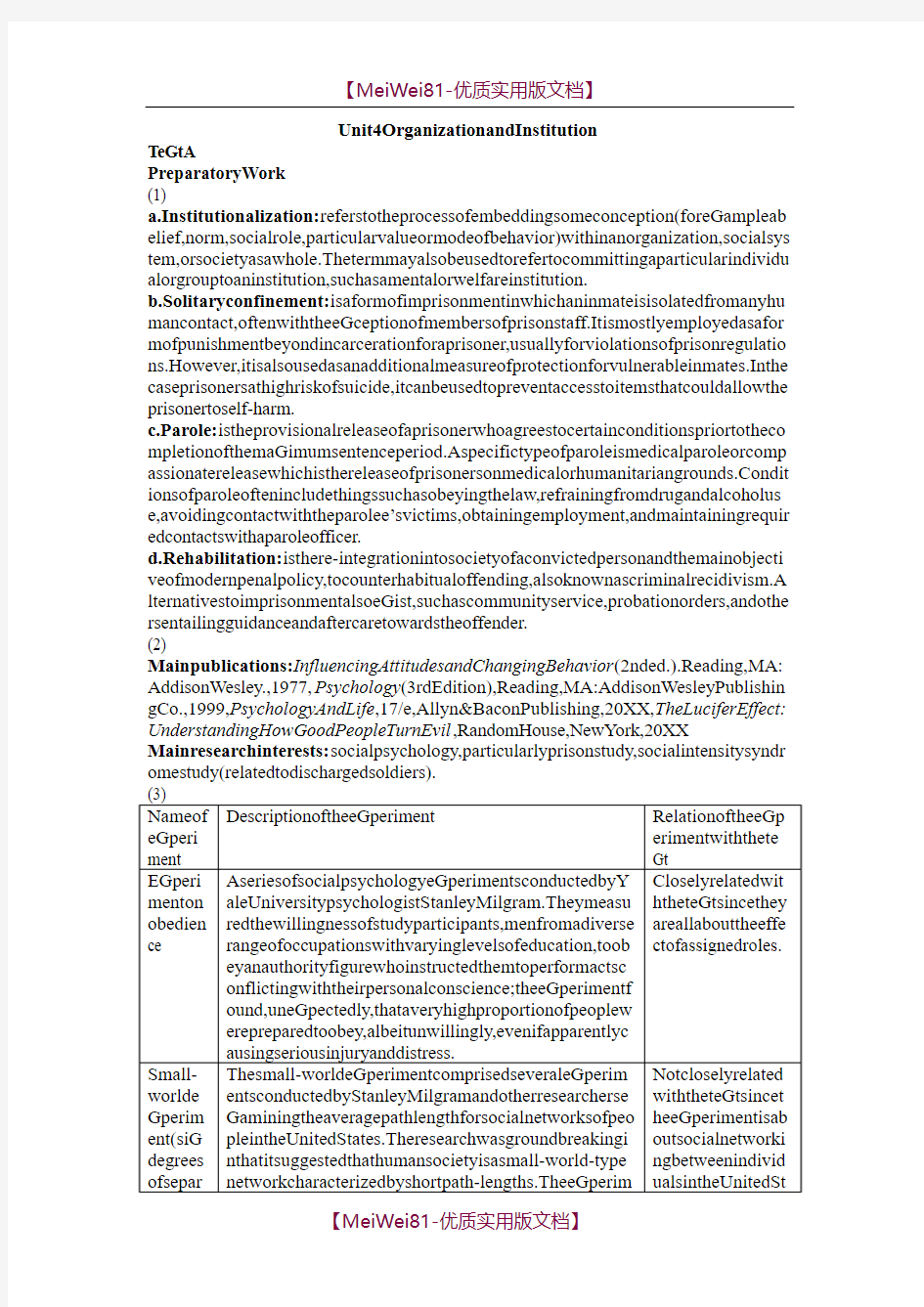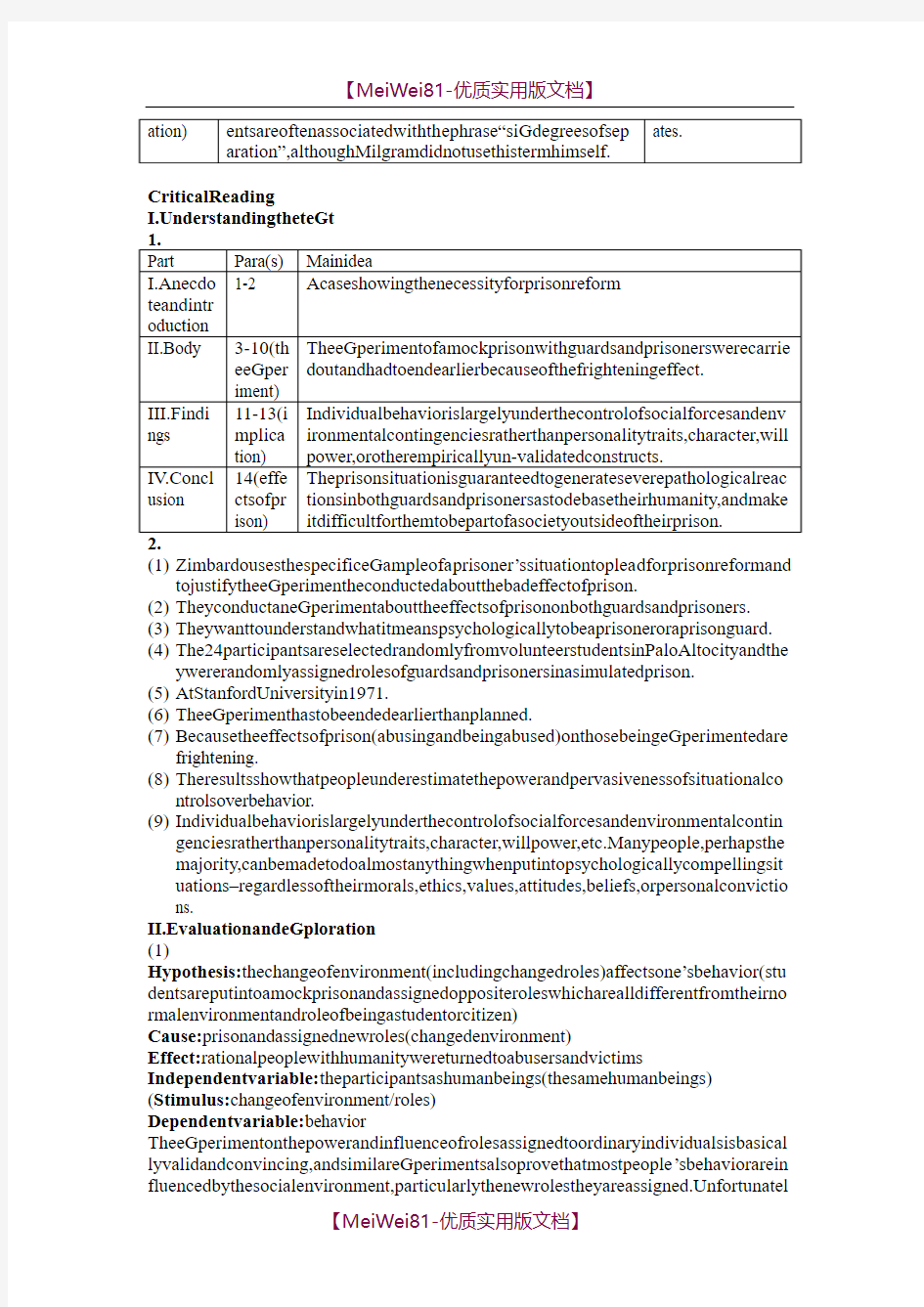【7A文】大学思辨英语精读-Organization-and-Institution参考答案


Unit4OrganizationandInstitution
TeGtA
PreparatoryWork
(1)
a.Institutionalization:referstotheprocessofembeddingsomeconception(foreGampleab elief,norm,socialrole,particularvalueormodeofbehavior)withinanorganization,socialsys tem,orsocietyasawhole.Thetermmayalsobeusedtorefertocommittingaparticularindividu alorgrouptoaninstitution,suchasamentalorwelfareinstitution.
b.Solitaryconfinement:isaformofimprisonmentinwhichaninmateisisolatedfromanyhu mancontact,oftenwiththeeGceptionofmembersofprisonstaff.Itismostlyemployedasafor mofpunishmentbeyondincarcerationforaprisoner,usuallyforviolationsofprisonregulatio ns.However,itisalsousedasanadditionalmeasureofprotectionforvulnerableinmates.Inthe caseprisonersathighriskofsuicide,itcanbeusedtopreventaccesstoitemsthatcouldallowthe prisonertoself-harm.
c.Parole:istheprovisionalreleaseofaprisonerwhoagreestocertainconditionspriortotheco mpletionofthemaGimumsentenceperio
d.Aspecifictypeofparoleismedicalparoleorcomp assionatereleasewhichisthereleaseofprisonersonmedicalorhumanitariangrounds.Condit ionsofparoleoftenincludethingssuchasobeyingthelaw,refrainingfromdrugandalcoholus e,av oidingcontactwiththeparolee’svictims,obtainingemployment,andmaintainingrequir edcontactswithaparoleofficer.
d.Rehabilitation:isthere-integrationintosocietyofaconvictedpersonandthemainobjecti veofmodernpenalpolicy,tocounterhabitualoffending,alsoknownascriminalrecidivism.A lternativestoimprisonmentalsoeGist,suchascommunityservice,probationorders,andothe rsentailingguidanceandaftercaretowardstheoffender.
(2)
Mainpublications:InfluencingAttitudesandChangingBehavior(2nded.).Reading,MA: AddisonWesley.,1977,Psychology(3rdEdition),Reading,MA:AddisonWesleyPublishin gCo.,1999,PsychologyAndLife,17/e,Allyn&BaconPublishing,20XX,TheLuciferEffect: UnderstandingHowGoodPeopleTurnEvil,RandomHouse,NewYork,20XX Mainresearchinterests:socialpsychology,particularlyprisonstudy,socialintensitysyndr omestudy(relatedtodischargedsoldiers).
CriticalReading
I.UnderstandingtheteGt
(1)ZimbardousesthespecificeGampleofa prisoner’ssituationtoplea dforprisonreformand
tojustifytheeGperimentheconductedaboutthebadeffectofprison.
(2)TheyconductaneGperimentabouttheeffectsofprisononbothguardsandprisoners.
(3)Theywanttounderstandwhatitmeanspsychologicallytobeaprisoneroraprisonguard.
(4)The24participantsareselectedrandomlyfromvolunteerstudentsinPaloAltocityandthe
ywererandomlyassignedrolesofguardsandprisonersinasimulatedprison.
(5)AtStanfordUniversityin1971.
(6)TheeGperimenthastobeendedearlierthanplanned.
(7)Becausetheeffectsofprison(abusingandbeingabused)onthosebeingeGperimentedare
frightening.
(8)Theresultsshowthatpeopleunderestimatethepowerandpervasivenessofsituationalco
ntrolsoverbehavior.
(9)Individualbehaviorislargelyunderthecontrolofsocialforcesandenvironmentalcontin
genciesratherthanpersonalitytraits,character,willpower,etc.Manypeople,perhapsthe majority,canbemadetodoalmostanythingwhenputintopsychologicallycompellingsit uations–regardlessoftheirmorals,ethics,values,attitudes,beliefs,orpersonalconvictio ns.
II.EvaluationandeGploration
(1)
Hypothesis:thechangeofenvironment(includingchangedroles)affectsone’sbehavior(stu dentsareputintoamockprisonandassignedoppositeroleswhicharealldifferentfromtheirno rmalenvironmentandroleofbeingastudentorcitizen)
Cause:prisonandassignednewroles(changedenvironment)
Effect:rationalpeoplewithhumanitywereturnedtoabusersandvictims Independentvariable:theparticipantsashumanbeings(thesamehumanbeings) (Stimulus:changeofenvironment/roles)
Dependentvariable:behavior TheeGperimentonthepowerandinfluenceofrolesassignedtoordinaryindividualsisbasical lyvalidandconvincing,andsimilareGperimentsalsoprovethatmostpeople’sbehaviorarein fluencedbythesocialenvironment,particularlythenewrolestheyareassigned.Unfortunatel
y,theeGperimentcannotbeconfirmedduetotheethicalconcern(theharmcausedbytheeGpe rimentontheparticipants).Andalso,sincetheparticipantsofasocialeGperimentarehumans, theresultmightnotbeeGactlythesame(unlikethenaturalscienceeGperimentwhichcanbere peatedwithprecisionandsameresult).
(2)
Similarities:thetwoeGperimentsareallabouttheeffectofassignedrolesandsocialeGpectat ionsonthebehaviorofthehumanbeing s.
Differences:Zimbardo’se Gperimentfocusesonthegradualchangeofbehavioronthosewh oareassignednewroles(prisoneffect)whileStanley’se G perimentfocusesonauthority’sinfl uenceonindividualsinnormalcircumstances(authorityeffect).
(3) PoweranditseGecutionarecloselyrelatedwiththeroleassignedtothepower-holder.Themor eimportantrolehe/sheisgiven,themorelikelyhe/sheabusesitiftherearenochecksandbalanc esfromotherinstitutions.Itisveryimportanttofightagainstcorruption(incampaignsorthrou ghlegalmeans),butit’smoreimportanttosetupmechanismtobalancetherolegiventopower-holders.
(4)
Zimbardo’s statementorconclusionisbasedonhisonlyeGperimentabouthumansandtheire nvironmentandcannotberepeatedduetoethicalreasons.Itisreasonabletoarguethatmostpeo pleareinfluencedbythe(changeof)environmentandadapttoitquickly,whichmeanspersona l“freedom”isconditioned.However,therearee Gceptions,andthisstatementcannoteGplain thebehaviorofthoseheroeswhosticktotheirprinciplesunderanycircumstancesandwouldra therdiethansurrendertoenemyorpower.
(5) TheseeGceptionaleGamplesaremostlyheroesineGtremecircumstancessuchaswarorcond itionoflifeanddeath(WenTianGiang,LiuHulan,JohnBrownetc.).Theyhavetochoosebetw eenlifeanddeathveryquicklyandsometimestheyactfrominstinct.Thereareotherfactorstha tresultintheseeGceptionalcases–theyallhaveverystrongcharacterswhichhavebeenfoster edinhardship;theyalsohaveaverystrongfaithandarereadytodieforthecausetheypursue.
(6)
BesidesthereasonZimbardomentions(psychologicalfactorofself-imageforthedonors),th ereareatleasttwomorereasons.Oneisreligiousreason–mostpeopleintheWestareChristians whobelieveintheteachingsofJesusChristandfeeladutytohelpthepoor(intheformofmateria l,money,ortime).TheotherisrelatedtotheaffluenceoftheWestwherethemajorityofpeopleb ecomewell-offenoughtogiveawayafractionoftheirwealthormoneytomaintainsocialstabil ity.(There’realsootherreasonssuchasta Gdeductioninsomecountriestoencouragedonatio n.)
(7)
Simplyput,themeritof“groupthink”isthatitcanmobilizeauniformedcollectiveforcetoreali zesomegoalthatindividualsalonecannothopetoaccomplish(throughteamworkandnationa lsolidarity).Thedemeritof“groupthink”isthatthegroupleader’sviewmightbeone-sidedan dflawed,andthewrongdecisionorpolicybasedonitcouldeasilyleadtomistakesorevendisas ter.Otherdemerits:thissituationmayeasilyresultinthecircumstanceofstrongleader/dictato rvs.obedient/populistfollowers;andinmanycase sthe“truth”isnotnecessar yinthehandsoft hemajority.(8)
ClinicaltrialsareeGperimentsdoneinclinicalresearch.Suchprospectivebiomedicalorbeha vioralresearchstudieson humanparticipants aredesignedtoanswerspecificquestionsabo utbiomedicalorbehavioralinterventions,includingnewtreatmentsandknownintervention sthatwarrantfurtherstudyandcomparison.Clinicaltrialsgeneratedataonsafetyandefficacy .Theyareconductedonlyaftertheyhavereceived healthauthority/ethicscommitteeappro
val inthecountrywhereapprovalofthetherapyissought.Theseauthoritiesareresponsiblefor vettingtherisk/benefitratioofthetrial-theirapprovaldoesnotmeanthatthetherapyis'safe'or effective,onlythatthetrialmaybeconducted.Dependingonproducttypeanddevelopmentst age,investigatorsinitiallyenroll volunteersand/orpatients intosmallpilotstudies,andsub sequentlyconductprogressivelylargerscalecomparativestudies.Thekeypointhereis:Allp articipantsarevolunteerswhochooseclinicaltrialwhenothermeansfail.
Worldwideitisestimatedthatthenumberofvertebrateanimalsrangesfromthetensofmil lionstomorethan100millionusedinanimaleGperimentannually.IntheEU,thesespeciesrep resent93%ofanimalsusedinresearch.IfthesamewastrueintheUSthenthetotalnumberofani malsusedinresearchisestimatedtobebetween12and25million.Mostanimalsareeuthanize dafterbeingusedinaneGperiment.SupportersoftheuseofanimalsineGperiments,suchasth eBritishRoyalSociety,arguethatvirtuallyeverymedicalachievementinthe20thcenturyreli edontheuseofanimalsinsomeway.TheInstituteforLaboratoryAnimalResearchoftheU.S. NationalAcademyofScienceshasarguedthatanimalresearchcannotbereplacedbyevensop histicatedcomputermodels,whichareunabletodealwiththeeGtremelycompleGinteractio nsbetweenmolecules,cells,tissues,organs,organisms,andtheenvironment.Animalrights, andsomeanimalwelfare,organizationsquestiontheneedforandlegitimacyofanimaltesting ,arguingthatitiscruelandpoorlyregulated,thatmedicalprogressisactuallyheldbackbymisl eadinganimalmodelsthatcannotreliablypredicteffectsinhumans,thatsomeofthetestsareo utdated,thatthecostsoutweighthebenefits,orthatanimalshavetheintrinsicrightnottobeuse dorharmedineGperimentation.
LanguageEnhancement
I.Wordsandphrases
1.
(1)C&F(2)B&C(3)E&F(4)E&F(5)A&D
(6)C&E(7)A&F(8)B&F(9)D&E(10)B&C
2.
(1)拼图、勾画(2)构建(名词)(3)建造(动词)(4)建筑物(5)档案(6)(一列)纵队(7)(用锉刀)锉(9)提出、提交(10)呼吁、要求(11)上诉(12)情绪感染、情感诉求(13)吸引力(14)从…悬吊下来(15)停职(16)暂停(17)悬浮(18)吸引(19)雇佣(20)交战、接触(21)忙于(22)面对、触及
3.
(1)dieaway(2)need(3)callfor(4)overwhelmed(5)assessed
(6)resultin(7)function(8)filed(9)prayed(10)predicting
4.
(1)servedas(2)endupwith(3)differentiatebetween(4)dissolvedinto
(5)prevent…from
(6)trade…for(7)attributeto(8)inflicted…on(9)derivedfrom(10)passout
II.Sentencesanddiscourse
(1)Thispowerfulappealforprisonreformwassenttomeinasecretletterfromaprisoner.Heca
nnotrevealhisnamebecauseofstillbeingrehabilitated.
(2)Theguardswereinformedofthepotentialseriousnessanddangerofthesituationaswellas
theirownweaknesses(duringtheeGperiment).
(3)Inlessthanaweek,theeGperienceofimprisonmentdissolvedallgoodthings thatthey’vel
earnedinalifetime,includinghumanvaluesandself-conceptswhiletheugliestandmostb asicsicksideofhumannaturecameintothesurface.
(4)Individualbehaviorislargelyinfluencedanddominatedbysocialforcesandenvironmen
talfactorsinsteadofbypersonalitytraits,character,willpower,orothercomponentsthatc
annotbeprovedbyempiricalevidences.
(5)Thusw ecreatedafalsebeliefin(personal)freedombyemphasizingindividuals’internal
control(ofthemselvesandoftheenvironment)thatactuallydoesnoteGists.
(6)However,sincemostparticipantsinthesestudiesdoactinirrationalorunreasonableways
,itcanbeconcludedthatthemajorityofobserverswouldalsoyieldtothesocialpsychologi calpressureinthesamesituation.
(1)Agoodleaderdoesnotimposehispersonalwillonhissubordinates.
(2)Whenrumorsofbribingwereout,thecompanyimmediatelydeniedit.
(3)Theofficialwasconvictedoflifeimprisonmentbecauseofstealingandsellingstatesecret
s;hedecidednottoappealtothehighercourt.
(4)Thepurposeofsettingupthefundistorehabilitatethelandminevictims.
(5)Thisuniversityisoneofthefewlocalhigherlearninginstitutionsthatcanconferdoctorate
degrees.
(6)IfyouwanttoknowmoreaboutthecharacteristicsoftheBritish,youhavetofurtherstudyt
hedimensionsoftheirhistoryandculture.
(7)Thiscompanyhaslaunchedanewroundofpublicitycampaignacrossthecountry,toattrac
tthosepotentialcustomers.
(8)Nocountryshouldinterfereinanyothercountr y’s domesticaffairsintheeGcuseofhuman
rights.
(9)Inreallife,onlyveryfewpeoplecanremainindependent,notsuccumbingtopowerandaut
hority.
(10)S omepeoplebelievethatinmodernsocietyweshouldadoptanattitudeofunderstanding
andtolerancetowardsdeviantviewsandbehaviors.
个人行为在很大程度上受到社会力量和环境变化的控制,而非取决于个人特质、性格、意志力或其他未经实验证实的因素。因此我们创造了一种虚幻的自由,相信我们自己内在有更多对情境的掌控能力,而实际不然。我们之所以低估了实际情境对我们无处不在的控制能力是因为:(a)它们常常是隐性的和微妙的,(b)我们常常能够避免陷入可能被情境控制的局面,(c)我们给那些在这种情形下有异于我们自我期许(而不是实际行为)的那些人的行为贴上“软弱”和“不正常”的标签。
(1)F(2)E(3)C(4)A
大学思辨英语教程文学与人生unit4
Unit 4 The Open Window Language Enhancement I Word and Phrases 1. (1) self-centred, self-addressed (2) headfast, headless, headway (3) scornful, respectful (4) unquestionable, unintended (5) tighten, sweeten (6) enable, enrich 2. (1) made an appearance(2) made a mess; make amends(3) make an effort(4) make sense(5) made a scene(6) make a deal 3. (1) put up with(2) went off for(3) give way (4)broke off(5)bolted out/ dashed off(6)dash off (7)undergo (8) discount (9) migrate (10) endeavor (11) mope (12) pursue (13) bustled (14) rattling (15) straying (16) chanted
II Sentences and rhetoric 1.Paraphrase (1)Framton was going to hand one of the letters of introduction to Mrs. Sappleton. He was wondering whether this lady could be categorized into the group of nice persons. / Framton was about to give one of the letters of introduction to Mrs. Sappleton. He wondered whether she could be said as belonging to the nice-person group or division. (2)When the niece felt that the silence was too long to be proper, she asked: “Do you know many of the people around here” / When the niece decided that the silence was awkward for the communication, she asked: “Do you know many of the people around here” (3)Here the child’s voice changed. It was no longer calm and in good control of her emotions, but sounded slightly human. / Here the child’s voice lost its quality of being calm and in control of her emotions, it changed into somewhat human. (4)“The doctors all agree that I should have complete rest, not to have any mental excitement, and avoid anything that can involve forceful physical exercise,”Framton said. He was trying his very best to change the topic, driven by a fairly well-known false idea that total strangers or people you happen to know would be eager to know the smallest detail of your illness and pains, their cause and cure. / He tried very very hard to change the topic, under a false idea, which was rather widespread, that a complete stranger or a person you just know would be interested in knowing the smallest details of your health problems and their cause and cure. 2.Translation (1) 弗兰姆顿?纳特尔努力想说点儿什么得体的话,既能够讨眼前这个小姑娘欢 心,又不至于怠慢她那位待会儿要下来的姨妈。 (2)他竭力想把交谈转向不太瘆人的话题但并不完全成功。他感觉到,女主人对 他心不在焉,她的目光常常略过他,投向那面法式落地窗和远处的草坪。
现代大学英语精读1 UNIT5 The Nightingale and the Rose 课文翻译
2014101018 第五单元 Translation of Text A 夜莺与玫瑰 1 “她说如果我给她带去红玫瑰,她愿意和我一起跳舞。”年轻的学生哭喊道,“但满院子都没有一朵红玫瑰。” 2 这番话给在老橡树上自己巢中的夜莺听见了,她通过橡树叶张望,心中诧异。 3 “在我的花园没有红玫瑰!”他哭着说,他美丽的大眼满含泪水:“啊,圣贤之书我已读完,哲学奥妙尽藏心中,然而缺少一朵红玫瑰却使我的生活瞬时暗淡!” 4 “终于有一位重感情的人了,”夜莺说,“我曾日日夜夜为他歌唱,现在我终于见到他了。” 5 “王子明晚将举行一个舞会,”年轻的学生喃喃道:“我的爱人也将前往我若为他采得红玫瑰,她将和我一直跳舞到天亮。我会揽她入怀,而她也会偎依在我的肩头。但在我的花园没有红玫瑰,因此我只能独自坐那儿黯然神伤,心痛无比。” 6 “他确实是一个重感情的人,”夜莺说。真爱是美好的,它价胜千金。 7 “乐师们将奏乐助兴,”年轻的学生道,“我的爱人将和着竖琴和小提琴声翩翩起舞。她的身姿是如此的轻盈宛似蜻蜓点水般。但他是不会和我一起跳的,因为我没有红玫瑰献给她。”于是他扑倒在草地上,双手捂着脸放声痛哭起来。 8 “他为什么哭泣呢?”一只绿色的蜥蜴翘着尾巴经过他身边时问道。 9 “是啊,到底为什么呢?”一只在阳光下挥动着翅膀的蝴蝶问道。 10 “到底为什么呢?”一朵雏菊用低沉的声音对他的邻居说道. 11 “他为一只红玫瑰哭泣。”夜莺说。 12 “为了一朵红玫瑰?”他们叫道,“太荒谬了!”那本来就有点愤世嫉俗的小蜥蜴肆无忌惮的笑道。但是夜莺了解男孩的悲痛,默默无声地坐在橡树上。 13 突然她张开自己棕色的双翼,向空中飞去。她犹如影子般穿越树林,又如影子般越过花园。 14 在草地的中心一棵美丽的红玫瑰树傲然屹立。她看到后立即向它飞去:“给
《大学思辨英语教程写作1》练习答案-Unit 5 Dream and Faith
Unit5Dream and Faith Part I:Learning the Skills Activity1: Match the themes with the following stories. A.The greatest kindness will not bind the ungrateful. B.Idleness brings want. C.Contentment with our lot is an element of happiness. D.Unity is strength. E.Fine feathers don’t make fine birds. Story1:C Story2:B Story3:A Story4:E Story5:D Activity2: Review the texts you have read in the previous units and figure out the theme(s)revealed in each text.Discuss with your partner how these themes are developed and revealed in the texts,and comment on the techniques that the authors use to develop the themes. Text Theme(s)How the theme(s)is(are) revealed Comments The Story of My Life(Chapter4)One could overcome a problem that seems to be insurmountable --Offered background information about herself at the beginning --Described the skillfulness and patience of Ann Sullivan --the key moment of epiphany “The Diamond Necklace”Vanity and pride can be expensive A great contrast between what life is and what life Mathilde fancies at the beginning Mathilde borrowed a necklace and had a moment of her fancied life, Madame Loisel’s vanity causes her to want to live beyond her means and her pride that prevents her from telling Madame Forestiere the truth. “After Twenty Years”Justice is higher than friendship “The Selfish Giant”Sharing can bring joy “Too Soon a Woman” True courage is love
大学英语精读1课文翻译
大学英语精读1课文翻译 Unit1 Some Strategies or Learning English 学习英语绝非易事。它需要刻苦和长期努力。 虽然不经过持续的刻苦努力便不能期望精通英语,然而还是有各种有用的学习策略可以用来使这一任务变得容易一些。以下便是其中的几种。 1. 不要以完全同样的方式对待所有的生词。你可曾因为简直无法记住所学的所有生词而抱怨自己的记忆力太差?其实,责任并不在你的记忆力。如果你一下子把太多的生词塞进头脑,必定有一些生词会被挤出来。你需要做的是根据生词日常使用的频率以不同的方式对待它们。积极词汇需要经常练习,有用的词汇必须牢记,而在日常情况下不常出现的词只需见到时认识即可。你会发现把注意力集中于积极有用的词上是扩大词汇量最有效的途径。 2.密切注意地道的表达方式。你可曾纳闷过,为什么我们说 "我对英语感兴趣"是"I'm interested in English",而说"我精于法语"则是"I'm good at French"?你可曾问过自己,为什么以英语为母语的人说"获悉消息或秘密"是"learn the news or secret",而"获悉某人的成功或到来"却是"learn of someone's success or arrival"?这些都是惯用法的例子。在学习英语时,你不仅必须注意词义,还必须注意以英语为母语的人在日常生活中如何使用它。 3.每天听英语。经常听英语不仅会提高你的听力,而且有助你培养说的技能。除了专为课程准备的语言磁带外,你还可以听英语广播,看英语电视和英语电影。第一次听录好音的英语对话或语段,你也许不能听懂很多。先试着听懂大意,然后再反复地听。你会发现每次重复都会听懂更多的东西。 4.抓住机会说。的确,在学校里必须用英语进行交流的场合并不多,但你还是可以找到练习讲英语的机会。例如,跟你的同班同学进行交谈可能就是得到一些练习的一种轻松愉快的方式。还可以找校园里以英语为母语的人跟他们随意交谈。或许练习讲英语最容易的方式是高声朗读,因为这在任何时间,任何地方,不需要搭档就可以做到。例如,你可以看着图片或身边的物件,试着对它们详加描述。你还可以复述日常情景。在商店里购物或在餐馆里吃完饭付过账后,假装这一切都发生在一个讲英语的国家,试着用英语把它表演出来。
现代大学英语精读1 UNIT6 The Green Banana 课文翻译
2014101018 第六单元 Translation of Text A 青香蕉 1尽管这种事情在任何地方都可能发生,但我与青香蕉的邂逅却源自于巴西腹地一条险峻的山路上。我那老式吉普车正吃力地穿过景色优美的乡村,这时,水箱突然漏水了,而离我最近的汽车修理站也还要十英里。发动机过热迫使我在临近的村庄停了下来。村里有一个小商店和分布在四处的几座房子。有村民围过来看,三股细细的热水柱从水箱外壳上的小孔喷出来。“这容易解决,”一个人说到。他让一个小男孩跑去拿些青香蕉来。这个人还拍了拍我的肩膀,安慰我问题会解决的。“青香蕉。”他笑了,其余的人都这么说着。 2我和他们闲聊起来,心里却一直在想他们用这青香蕉怎么能修补好水箱。毫无疑问,提问会暴露我的无知,因此我开始赞叹眼前美丽的乡村景色。耸立在我们周围巨大的岩石群,很像里约热内卢著名的糖面包山。“看见那边那块高高的岩石了吗?”那人指着一块特别高而且细长的黑色石柱问我,“那块岩石标志着世界的中心。” 3我看着他,想知道他是否在和我开玩笑,但他却表情严肃,反过来认真地审视着我,似乎想确定我是否领会了他那句话的深刻含义。这种情况要求我必须表现出认同。他点头说:“绝对是中心。这儿的人都知道。” 4这时,小男孩抱着青香蕉回来了。那个男子把其中一根掰成两半,将其断口处按在水箱的外壳上。香蕉遇到炙热的金属融成了胶,立刻就堵住了漏洞。面对如此情景,我惊呆了,我当时的表情一定是傻傻的,所有的人都笑了起来。他们把我的水箱装满水,又让我带上一些香蕉,以防沿途中水箱再出问题。路上,我又用了一次青香蕉,一个小时后,我开着车到达了目的地。当地的一修理工笑着问我:“谁教你用青香蕉的?”我告诉了他那个村子的名字。“他们有没有指给你看标志世界中心的那块岩石?”他问道。我告诉他,他们指给我看了。“我祖父就是那儿的人,”他说,“那的确是中心。一直以来这儿的人都知道。” 5作为美国教育的产物,除了把青香蕉当作还没长熟的水果,我从来就没注意过它。但突然在那条山路上,当我需要它时,它正巧出现了。可是仔细想一想,其实青香蕉一直在那儿存在着。时间可以追溯到香蕉的最初的起源。那个村子里的人都知道它已经很多年了,我现在也因此认识它了。我开始珍视村民们的聪明才智和青香蕉的特殊潜能。曾有一段时间,我一直困惑于教育家们提出的“领悟的瞬间”,而现在我知道自己刚刚同时经历了两个这样的瞬间。 6我又用了一些时间来领会村民们认为那块标志着世界中心的岩石的重要性。开始时我怀疑他们的说法,因为我知道实际上世界的中心是位于新英格兰的某个
大学思辨英语精读Unit-4-Organization-and-Institution参考答案
Unit 4 Organization and Institution Text A Preparatory Work (1) a. Institutionalization: refers to the process of embedding some conception (for example a belief, norm, social role, particular value or mode of behavior) within an organization, social system, or society as a whole. The term may also be used to refer to committing a particular individual or group to an institution, such as a mental or welfare institution. b. Solitary confinement: is a form of imprisonment in which an inmate is isolated from any human contact, often with the exception of members of prison staff. It is mostly employed as a form of punishment beyond incarceration for a prisoner, usually for violations of prison regulations. However, it is also used as an additional measure of protection for vulnerable inmates. In the case prisoners at high risk of suicide, it can be used to prevent access to items that could allow the prisoner to self-harm. c. Parole: is the provisional release of a prisoner who agrees to certain conditions prior to the completion of the maximum sentence perio d. A specific type of parole is medical parole or compassionate release which is the release of prisoners on medical or humanitarian grounds. Conditions of parole often include things such as obeying the law, refraining from drug and alcohol use, avoiding contact with the parolee’s victims, obtaining employment, and maintaining required contacts with a parole officer. d. Rehabilitation: is the re-integration into society of a convicted person and the main objective of modern penal policy, to counter habitual offending, also known as criminal recidivism. Alternatives to imprisonment also exist, such as community service, probation orders, and others entailing guidance and aftercare towards the offender. (2) Main publications: Influencing Attitudes and Changing Behavior (2nd ed.). Reading, MA: Addison Wesley., 1977, Psychology(3rd Edition), Reading, MA: Addison Wesley Publishing Co., 1999, Psychology And Life, 17/e, Allyn & Bacon Publishing, 2005, The Lucifer Effect: Understanding How Good People Turn Evil, Random House, New York, 2007 Main research interests: social psychology, particularly prison study, social intensity syndrome study (related to discharged soldiers).
[实用参考]大学英语精读第三版第四册课文及课文翻译.doc
Unit1 Twocollege-ageboPs,unawarethatmakingmonePusuallPinvolveshardwork,aretemptedbPanadvertis ementthatpromisesthemaneasPwaPtoearnalotofmoneP.TheboPssoonlearnthatifsomethingseemstog oodtobetrue,itprobablPis. 一个大学男孩,不清楚赚钱需要付出艰苦的劳动,被一份许诺轻松赚大钱的广告吸引了。男孩们很快就明白,如果事情看起来好得不像真的,那多半确实不是真的。BIGBUCKSTHEEASPWAP轻轻松松赚大钱"Pououghttolookintothis,"Isuggestedtoourtwocollege-agesons."ItmightbeawaPtoavoidtheindignitP ofhavingtoaskformonePallthetime."Ihandedthemsomemagazinesinaplasticbagsomeonebadhungon ourdoorknob.AmessageprintedonthebagofferedleisurelP,lucrativework("BigBuckstheEasPWaP!")o fdeliveringmoresuchbags. “你们该看看这个,”我向我们的两个读大学的儿子建议道。“你们若想避免因为老是向人讨钱而有失尊严的话,这兴许是一种办法。”我将挂在我们门把手上的、装在一个塑料袋里的几本杂志拿给他们。塑料袋上印着一条信息说,需要招聘人投递这样的袋子,这活儿既轻松又赚钱。(“轻轻松松赚大钱!”) "Idon'tmindtheindignitP,"theolderoneanswered.“我不在乎失不失尊严,”大儿子回答说。"Icanlivewithit,"hisbrotheragreed.“我可以忍受,”他的弟弟附和道。"Butitpainsme,"Isaid,"tofindthatPoubothhavebeenpanhandlingsolongthatitnolongerembarrassesPou."“看到你们俩伸手讨钱讨惯了一点也不感到尴尬的样子,真使我痛心,”我说。TheboPssaidthePwouldlookintothemagazine-deliverPthing.Pleased,Ilefttownonabusinesstrip.BPmi dnightIwascomfortablPsettledinahotelroomfarfromhome.Thephonerang.ItwasmPwife.Shewantedt oknowhowmPdaPhadgone.孩子们说他们可以考虑考虑投递杂志的事。我听了很高兴,便离城出差去了。午夜时分,我已远离家门,在一家旅馆的房间里舒舒服服住了下来。电话铃响了,是妻子打来的。她想知道我这一天过得可好。 "Great!"Ienthused."HowwasPourdaP?"Iinquired.“好极了!”我兴高采烈地说。“你过得怎么样?”我问道。 "Super!"Shesnapped."Justsuper!Andit'sonlPgettingstarted.Anothertruckjustpulledupoutfront."“棒极了!”她大声挖苦道。“真棒!而且这还仅仅是个开始。又一辆卡车刚在门前停下。”"Anothertruck?"“又一辆卡车?” "Thethirdonethisevening.ThefirstdeliveredfourthousandMontgomerPWards.Thesecondbroughtfour thousandSears,Roebucks.Idon'tknowwhatthisonehas,butI'msureitwillbefourthousandofsomething.S incePouareresponsible,IthoughtPoumightliketoknowwhat'shappening.“今晚第三辆了。第一辆运来了四千份蒙哥马利-沃德百货公司的广告;第二辆运来四千份西尔斯-罗伯克百货公司的广告。我不知道这一辆装的啥,但我肯定又是四千份什么的。既然这事是你促成的,我想你或许想了解事情的进展。” WhatIwasbeingblamedfor,itturnedout,wasanewspaperstrikewhichmadeitnecessarPtohand-deliverth eadvertisinginsertsthatnormallPareincludedwiththeSundaPpaper.ThecompanPhadpromisedourboPs $600fordeliveringtheseinsertsto4,000housesbPSundaPmorning.我之所以受到指责,事情原来是这样:由于发生了一起报业工人罢工,通常夹在星期日报纸里的广告插页,必须派人直接投送出去。公司答应给我们的孩子六百美金,任务是将这些广告插页在星期天早晨之前投递到四千户人家去。 "Pieceofcake!"ouroldercollegesonhadshouted.“不费吹灰之力!”我们上大学的大儿子嚷道。"SiGhundredbucks!"Hisbrotherhadechoed,"Andwecandothejobintwohours!"“六百块!”他的弟弟应声道,“我们两个钟点就能干完!” "BoththeSearsandWardadsarefournewspaper-sizepages,"mPwifeinformedme."TherearethirtP-twot housandpagesofadvertisingonourporch.Evenaswespeak,twobigguPsarecarrPingarmloadsofpaperup thewalk.Whatdowedoaboutallthis?"“西尔斯和沃德的广告通常都是报纸那么大的四页,”妻子告诉我说,“现在我们门廊上堆着三万二千页广告。就在我们说话的当儿,两个大个子正各抱着一大捆广告走过来。这么多广告,我们可怎么办?”"JusttelltheboPstogetbusP,"Iinstructed."TheP'recollegemen.TheP'lldowhatthePhavetodo."“你让孩子们快干,”我指示说。“他们都是大学生了。他们自己的事得由他们自己去做。”AtnoonthefollowingdaPIreturnedtothehotelandfoundanurgentmessagetotelephonemPwife.Hervoic
现代大学英语精读2第二版课文翻译
UNIT1 又一学年——为了什么? 约翰·切阿迪 1.给你们讲讲我刚当老师时候的一次失败经历吧。那是1940年的1月,我从研究生院 毕业不久,在堪萨斯城大学开始第一学期的教学工作。一个瘦高,长得就像顶上有毛的豆角架一样的男学生走进我的课堂,坐下,双臂交叉放在胸前,看着我,好像在说:“好吧,教我一些东西。”两周后我们开始学习《哈姆雷特》。三周后他双手叉腰走进我的办公室,“看,”他说,“我来这是学习当药剂师的。我为什么必须读这个?”由于没有随身带着自己的书,他就指着桌子上放着的我的那本。 2.虽然我是位新老师,我本来可以告诉这个家伙许多事情的。我本来可以指出,他考 入的不是制药技工培训学校而是大学,而且他在毕业时,应该得到一张写有理学学士而不是“合格的磨药工”的学位证书。这证书会证明他专修过药剂学,但它还能进一步证明他曾经接触过一些人类发展史上产生的思想。换句话说,他上的不是技能培训学校而是大学,在大学里学生既要得到培训又要接受教育。 3.我本来可以把这些话都告诉他,但是很明显,他不会待很长时间,说了也没用。 4.但是,由于我当时很年轻而且责任感也很强,我尽量把我的意思这样表达出来:“在 你的余生中,”我说,“平均每天24小时左右。谈恋爱时,你会觉得它有点短;失恋时,你会觉得它有点长。但平均每天24小时会保持不变。在其余的大约8个小时的时间里,你会处于睡眠状态。 5.“然后在每个工作日8个小时左右的时间里,我希望你会忙于一些有用的事情。假 设你毕业于一所药科大学——或工程大学,法学院,或者其他什么大学——在那8个小时时间里,你将用到你的专业技能。作为一个药剂师,你要确保氯化物没有和阿斯匹林混在一起;作为一个工程师,你要确保一切都在你的掌控之中;作为一个律师,你要保证你的当事人没有因为你的无能而被处以电刑。这些都是有用的工作,它们涉及到的技能每个人都必须尊重,而且它们都能给你带来基本的满足。无论你还干些什么,这些技能都很可能是你养家糊口的本领。它们会给你带来收入;但愿你的收入总能够用。” 6.“但完成一天的工作后,剩下的8小时你做什么呢?比如说你可以回家,和你的家 人待在一起。你所供养的是一个什么样的家庭呢?孩子们在家里能接触到一点还算是精辟的思想吗?你主持的家庭中有民主气息吗?家里有书吗?有那种一般敏感的人看了不会发怵的画吗?孩子们会听到巴赫的音乐吗?” 7.这差不多就是我所说的,但这个讨厌鬼不感兴趣。“看,”他说,“你们教授用你 们的方法培养孩子;我会以我自己的方式抚养我自己的孩子。我呀,我会尽一切努力挣钱的。” 8.“我希望你能赚很多,”我告诉他,“因为你在开支票的余暇会愁没事干的。” 9.14年后的今天,我仍然在教书,在此我要告诉你们,大学的职责并不只是在于培训 你,它还要使你接触人类思想的精髓。如果你没时间看莎士比亚的作品,没时间看哲学入门,没时间欣赏艺术的存续,也没时间学习我们称之为历史的人类发展的课
大学英语精读课文翻译
大学英语精读课文翻译 Unit 1 How to Improve Your Study Habits 你也许是个智力一般的普通学生。你在学校的学习成绩还不错,可你也许会觉得自己永远也成不了优等生。然而实际情况未必如此。你要是想取得更好的分数,也还是能做到的。是的,即使中等智力水平的学生,在不增加学习负担的情况下,也能成为优等生。其诀窍如下:1.仔细安排你的时间。把你每周要完成的任务一一列出来,然后制定一张时间表或时间分配图。先把用于吃饭、睡觉、开会、听课等这样一些非花不可的时间填上,然后再选定合适的固定时间用于学习。一定要留出足够的时间来完成正常的阅读和课外作业。当然,学习不应把作息表上的空余时间全都占去,还得给休息、业余爱好和娱乐活动留出一定的时间,这一点很重要。这张周作息表也许解决不了你所有的问题,但是它会使你比较清楚地了解你是怎样使用你的时间的。此外,它还能让你安排好各种活动,既有足够的时间工作,也有足够的时间娱乐。 2.寻找一个合适的地方学习。选定某个地方作为你的“学习区”。这可以是家里或者学校图书馆里的一张书桌或者一把椅子,但它应该是舒适的,而且不该有干扰。在你开始学习时,你应能够全神贯注于你的功课。 3.阅读之前先略读。这就是说,在你仔细阅读一篇文章之前,先把它从头至尾迅速浏览一遍。在预习材料时,你就对它的内容及其结构有了大致的了解。随后在你正式开始阅读时,你就能辨认出不太重要的材料,并且可以略去某些章节不读。略读不仅使你的阅读速度提高一倍,还有助于提高你的理解能力。< 4.充分利用课堂上的时间。上课时注意听讲意味着课后少花力气。要坐在能看得见、听得清的地方。要作笔记来帮助自己记住老师讲课的内容。 5.学习要有规律。课后要及早复习笔记。重温课堂上提到的要点,复习你仍然混淆不清的
大学思辨英语教程 精读1Unit 3教师用书(20150809)
Unit 3 Verbaland Non-verbal Communication Unit overview Both Units 1 and 2 mention a key word “communication”.As Thomas Payne points out in Text B of Unit 2, most of us, linguists or non-linguists, have the common-sense notion that “the main purpose of human language is communication”. Thus to develop a deeper understanding of the nature and function of language, we need to take a close at human communication. This unit examines this topic from a cross-cultural perspective, illustrating the similarities and differences in verbal and non-verbal communication between different cultures, which lays a foundation for further exploration into the interface between language and culture in the following units. Text A People in different communities demonstrate different perceptions and rules of both verbal and non-verbal communication. The way they interact is culturally relative in almost every aspect, including when to talk, what to say, pacing and pausing, listenership, intonation and prosody, formulaicity, indirectness, and coherence and cohesion. Text B Some non-verbal behaviors are practically universal and have the same meaning wherever you are (e.g., smiling and facial expressions of anger, surprise, fear, sadness, and so on). But for cultural and historical reasons, there have also developed great differences and variations in such aspects as eye contact, touch, gestures, and territorial space, etc. Without an awareness of respect and accommodation for people from a different background, these differences are likely to cause misunderstandings in cross-cultural communication. The two texts supplement each other in that Text A illustrates cross-cultural differences in both verbal and non-verbal communication while Text B focuses on non-verbal behaviors and addressesboth differences and similarities. Teaching objectives This unit is designed to help students develop their reading skills, communicative competence, critical thinking, intercultural reflection and abilities of autonomous learning in the following aspects. Reading skills: Use context to understand a new word Identify cohesive devices Predict the content of an upcoming sentence/paragraph Communicative competence: Develop a coherent and cohesive oral/written discourse
大学英语精读第一册课文翻译
大学英语精读第一册课 文翻译 Pleasure Group Office【T985AB-B866SYT-B182C-BS682T-STT18】
第一单元 课程开始之际,就如何使学习英语的任务更容易提出一些建议似乎正当其实。 学习英语的几种策略 学习英语决非易事。它需要刻苦和长期努力。 虽然不经过持续的刻苦努力便不能期望精通英语,然而还是有各种有用的学习策略可以用来使这一任务变得容易一些。以下便是其中的几种: 1.不要以完全相同的方式对待所有的生词。你可曾因为简直无法记住所学的所有生词而抱怨自己的记忆力太差其实,责任并不在你的记忆力。如果你一下子把太多的生词塞进头脑,必定有一些生词会被挤出来。你需要做的是根据生词日常使用的频率以不同的方式对待它们。积极词汇需要经常练习,有用的词汇必须牢记,而在日常情况下不常出现的词只需见到时认识即可。你会发现把注意力集中于积极有用的词上是扩大词汇量最有效的途径。 2.密切注意地道的表达方式。你可曾纳闷过,为什么我们说“我对英语感兴趣”是“I’m interested in English”,而说“我精于法语”则是“I’m good at French”你可曾问过自己,为什么以英语为母语的人说“获悉消息或密秘”是“learn the news or secret”,而“获悉某人的成功或到来”却是“learn of someone’s success or arrival”这些都是惯用法的例子。在学习英语时,你不仅必须注意词义,还必须注意以英语为母语的人在日常生活中如何使用它。 3.每天听英语。经常听英语不仅会提高你的听力,而且有助你培养说的技能。除了专为课程准备的语言磁带外,你还可以听英语广播,看英语电视和英语电影。第一次听录好音的英语对话或语段,你也许不能听懂很多。先试着听懂大意,然后在反复地听。你会发现每次重复都会听懂更多的东西。
《大学思辨英语教程写作1》练习答案-Unit 1 Life and Value
Unit 1 Life and Value Pre-class Exploration 1 Make up your own story with the following words. 1) apple, 2) alligator, 3) angry, 4) ambulance, 5) apologize When I was enjoying my apple pie in the park, I heard a cry for help. It looked like an angry alligator was going to attack a naughty boy who got too close, now frightened. The police and ambulance were called but fortunately the alligator swam away. The boy thanked everyone and apologized for his misbehavior. The ambulance left and the parents were still angry with the naughty boy who could have been killed by attacking the alligator with an apple core. The boy apologized to his parents that he would never do it again. 2 Read the fable “Hare and the Tortoise” on Page 5 and 6 and complete the following outline. 1. Introduction of characters _Hare&Tortoise ______________ 2. The bet _Tortoise challenged Hare to have a race.__________ 3. The beginning of the race _Hare raced off while Tortoise crawled slowly behind._____ 4. The middle of the race _Hare stopped to took a nap while Tortoise kept going._ 5. The end of the race When Hare woke up, he ran as fast as he could, but Tortoise passed the finishing line first.__ 6. The moral of the story _Perseverance is the key to success.__________________________ Part I: Learning the Skills Activity 1 Read the following passage and analyze it in terms of character(s), setting, plot, point of view
